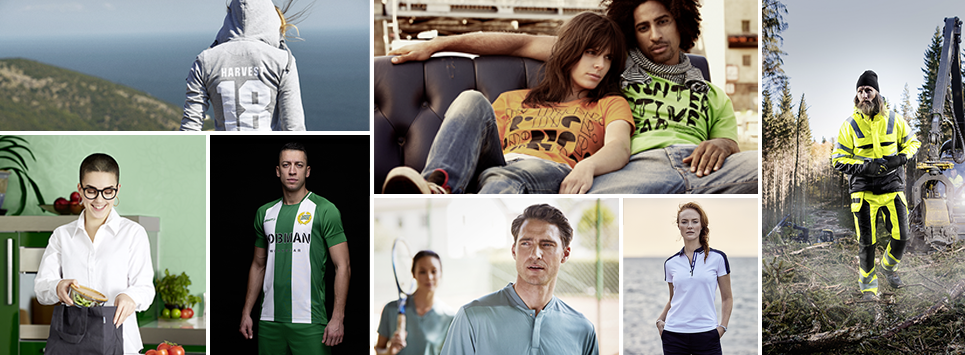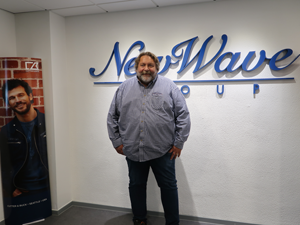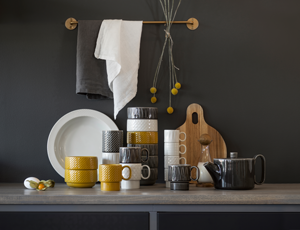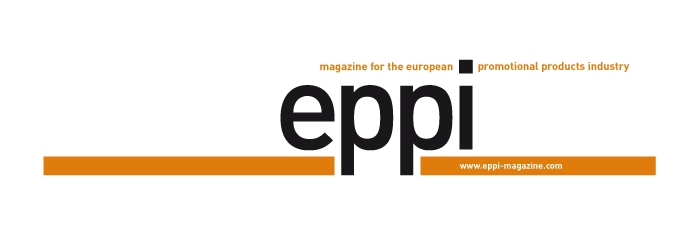From a small screen-printing company to a listed multinational: The New Wave Group is number 1 in Europe in the promotional textile sector, the group also supplies a comprehensive range of promotional products, sports garments and living accessories. Today, the corporate group that operates on the promotion, retail and sportswear markets unites around 50 brands and subsidiaries, including several European promotional products firms, under its roof.

In an era when promowear is not only considered to be an omnipresent marketing tool, but a huge selection of items is also available and can be embellished in tiny volumes, it is hard to believe that the situation used to be very different. “At the beginning of the 1980s it was easier selling promotional textiles in Sweden than buying them – not to mention the lack in choice and the poor cuts,” recalled Torsten Jansson, CEO and majority shareholder of the according to own accounts largest European supplier of advertising textiles: The New Wave Group. “At the time I had a small screen-printing shop and was constantly looking for reliable sources of supply, but nobody stocked goods. I thought there must be a different way of going about this.” In 1985, Jansson began to import a small range of five articles from Italy. “Then, from 1988 onwards I also imported goods from China – the fact that we got a foothold there at such an early stage, brought us invaluable advantages later.” The company New Wave that was officially founded in 1990 not only recognised the sign of the times early on as far as importing was concerned as Jansson reported: “From the very start we strove to take over a leading role in terms of quality and the depth of the range. When we offered a T-shirt in six standard colours for the first time, everyone was shocked. Furthermore, we were one of the first textile companies in Scandinavia to consistently establish itself on the market via the wholesale segment. This is still our only sales channel today.”

Torsten Jansson, CEO and majority shareholder of the New Wave Group.
Rapid growth followed. In fast succession, New Wave established international subsidiaries in Norway, Finland, Denmark, Germany, Italy, Spain, Great Britain, the Netherlands and France. The company additionally invested in its logistics and brand development and expanded its portfolio and market share through acquisitions. One of the first milestones was taking over the Swedish sports clothes specialists, Craft, in the year 1996, which at the same time signified entering the retail business as an additional sales channel. Among others, Texet (2000), DAD Sportswear and Jobman (both in 2004), Cutter & Buck (2007) and Ahead (2011) were added to the list of the company’s textile firms as well as the tableware and glass manufacturers, Sagaform (2001) and Orrefors Kosta Boda (2005). What’s more, three significant suppliers of haptic advertising were united under the roof of the group: The importer Toppoint (2002), the promotional products division of Swedish Match (2004) and the electronics specialist Intraco (2006). “Once we were well-aligned in the textile segment, we wanted to address the hardgoods market – however it is difficult to import oneself and be good in all sections,” explained Jansson. “By taking over Toppoint and Intraco we were able to win over two established players with fully-developed product line-ups and tested procurement and distribution structures.” The fast growth devoured capital which incited Jansson at an early stage to initiate a step that only a few companies on the promotional products market venture to take: Instead of seeking an alliance with an investment company, New Wave was floated on the stock exchange in 1997. At present, 13,780 shareholders have shares in the group (as of December 2018), as the main shareholder, Torsten Jansson holds the majority of the votes himself.
Decentralisation and synergies
Today, the New Wave Group is a conglomerate comprising of around 50 brands and subsidiaries, which operate in the company’s three segments: “Corporate”, “Sports & Leisure” as well as “Gifts & Home Furnishings”. “Across the group, we sell around 60% on the market for haptic advertising and 40% on the retail market – whereby this ratio varies from brand to brand,” reported Jansson. Many New Wave brands are offered on both the B2B and B2C markets – this minimises the risks and provides chances for growth and synergy effects. The New Wave Group maintains own sales offices in 17 countries, in some cases in combination with logistics centres. “Scandinavia is our most important market by far,” commented Jansson, “Central and Southern Europe also play an important role, particularly Germany and Italy.” The USA and Canada is also a significant market, which in the meantime accounts for 25% of the group’s turnover. A decentralised organisation allows the individual companies a high degree of independence and freedom of decision in the operative management. “In this way, we unite entrepreneur spirit and competence in the local markets with all of the advantages that the parent company brings with it,” explained Jansson. “Because of course there is a lot of cross-group collaboration, for example in the Marketing, Procurement, Logistics and Warehousing Departments or when it comes down to product development and design.”

New Wave Group offers two renowned interior brands with Sagaform (above) and Kosta Boda.
This especially applies for the textile area. Here, New Wave offers virtually everything that is demanded on the markets the group serves in terms of textiles, headware and footwear – with a depth of range that is incomparable. “We supply around 600 colours,” said Jansson, “nobody else can offer that except us.” To name but a few examples, in the B2B segment the line-up ranges from favourably-priced promowear for high volumes (Jingham, Printer), to the mid-range segment (Clique, Mac One), through to the premium sector (J. Harvest & Frost). The portfolio also encompasses sportswear and functional clothing (Ahead, D.A.D Sportswear, Craft), jackets (Grizzly), workwear (Jobman, Projob) or golf clothes and accessories (Cutter & Buck). “Each brand has its own design guideline, however we do bundle the product design in the corporate segment at least, because this is not as strongly coupled to the fast-moving fashion trends,” commented Jansson. The procurement processes in the textile area – also for the sportswear brands – are merged together to a large extent, in order to exploit advantages in procurement, quality control, logistics and CSR as far as possible. The New Wave Group employs over 200 people in Asia, 125 of whom work in China alone, its most important production country. The buying office in Shanghai which was already founded in 1992, is the hub of the import activities. The company also maintains three further offices in China as well as in Dhaka (Bangladesh), Ho Chi Minh City (Vietnam) and Bangalore (India). All on-site teams work closely together with the brand offices and the production development department and coordinate the flow of goods, the implementation of new models, the quality controls as well as last, but not least the social and environmental audits.
Benchmarks in sustainability
“We already began integrating sustainable aspects into our production chain in the 1990s,” stated Jansson. “Today, we strive to take on a leading role on the sustainability front. We have strongly increased the number of audited factories and products with sustainable characteristics over the past years and have been able to considerably reduce our emissions for transport. The fact that we are very active in the sports and merchandising area is a driving force here, after all we have to keep pace with the big sportswear brands and fulfil the strict requirements of the clubs.” The group is a member of numerous sustainability organisations and platforms, including amfori BSCI, the Fair Labour Organisation, the Textile Exchange, Mistra Future Fashion, the Swedish Chemicals Group and the Clean Shipping Index. New Wave is also one of the companies that have signed the “Accord on Fire and Building Safety in Bangladesh”. The aim of this commitment is to ensure a supply chain that is as sustainable and ethically safe as possible and ethically immaculate – Jansson: “In 2018, 92% of all our products that we purchased came from audited production sites, the target is to achieve 100% by 2020. Furthermore, by 2025 our aim is for 90% of all the textiles we buy to carry one or several sustainability seals.” The own label, Cottover, which was launched in 2015, is New Wave’s flagship for ecological textiles: All models of the collection comprise of fairly traded organic cotton or recycled polyester and they carry four certifications: Fair Trade, GOTS, Oeko-Tex and the Nordic Swan Ecolabel. An own CSR Supervisory Board monitors and coordinates the sustainability activities and performances, which have since 2017 additionally be documented in a detailed, annually revised sustainability report. “This is also of great value for our external image,” reported Jansson. “We are told by our customers more or less on a weekly basis that they have selected us because we publish a sustainability report.”
Logistical masterstrokes

As one of New Wave’s core brands in the Corporate segment, Clique boasts a huge selection of quality basic garments, available in a large span of colors, cuts and sizes.
The sustainable commitment of the group is even more impressive if one considers the huge volumes that the New Wave group moves every day. Whereas many importers bank on the greatest centralisation possible and install gigantic, centrally- located logistic hubs, where goods are not only stored, but also customised, the New Wave Group takes on a more decentralised approach. “Of course, we have central logistics centres in core markets, but these often supply local warehouses,” explained Jansson. “Furthermore, we have to an extent divided the delivery strands down into brands and also differentiate between textiles and hardgoods. For example, the logistics for the promotional products are coordinated by the headquarters of Toppoint in the Netherlands, where the products are also individualised.” New Wave sells the majority of its products in the textile segment without decoration, as Jansson elaborated: “It is not part of our corporate strategy to integrate textile customising as a value chain tool on a big scale. That would be a different business model. Our USPs are excellent service, selection and speed. We can deliver 98% of our textiles within 24 hours. The ability to deliver is paramount – that always was, is and will remain to be our philosophy.” A philosophy, which has enabled New Wave to decisively contribute towards the market for promotional textiles becoming totally different compared to 30 years ago.
// Till Barth
photos: Till Barth, © WA Media (1); New Wave (9)



